 “Why should we expect the young to show us any consideration? Seeing us can only remind them of death. And old people’s diseases. I’m not surprised to see them stay away.”
“Why should we expect the young to show us any consideration? Seeing us can only remind them of death. And old people’s diseases. I’m not surprised to see them stay away.”
Terence Rattigan, Separate Tables (courtesy of D.G. Myers)
Terry Teachout on the arts in New York City
In today’s Wall Street Journal I review two New York revivals, A.R. Gurney’s Love Letters and George Kelly’s The Fatal Weakness. Here’s an excerpt.
* * *
You know a playwright has really arrived when he has plays simultaneously running on and Off-Broadway. A.R. Gurney, Terrence McNally and Tom Stoppard are all being so honored this fall, and it’s Mr. Gurney who’s getting the fanciest treatment. While “The Wayside Motor Inn” is currently being performed by Signature Theatre, “Love Letters,” his perennially popular two-character epistolary play about a pair of aging childhood friends who should have been more, has just received its first Broadway revival since the original 1989 production, with Mia Farrow and Brian Dennehy leading a roster of nine stars who will rotate in and out of the show during its five-month run.
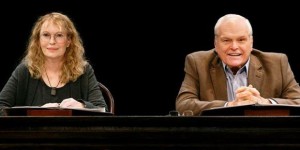 One reason why “Love Letters” is so frequently produced is that it’s written in such a way as to facilitate both come-and-go celebrity casting and bargain-basement staging. Not only is there no set, but the actors sit together at a table and read from scripts instead of memorizing their lines. But the enduring success of “Love Letters” is far more than a mere matter of logistical convenience. It’s one of Mr. Gurney’s best plays, a tender study of thwarted love….
One reason why “Love Letters” is so frequently produced is that it’s written in such a way as to facilitate both come-and-go celebrity casting and bargain-basement staging. Not only is there no set, but the actors sit together at a table and read from scripts instead of memorizing their lines. But the enduring success of “Love Letters” is far more than a mere matter of logistical convenience. It’s one of Mr. Gurney’s best plays, a tender study of thwarted love….
While Mr. Dennehy may not have been born to play a WASP named Andrew Makepeace Ladd III, his bluff, heartfelt simplicity of manner leaves little to be desired. Unlike him, Ms. Farrow has done comparatively little stage acting, and so the quivering intensity of her fearlessly projected, fully involved performance (you’d never guess that she hasn’t appeared in a commercial Broadway play since 1980) is the most gratifying of surprises…
The Mint Theater, which has a near-perfect track record of exhuming forgotten plays of the previous century that deserve a happier fate, has gone back to the well with George Kelly, the once-famous author of “The Show-Off,” whose “Philip Goes Forth” the Mint produced to brilliant effect last season. This time around it’s “The Fatal Weakness,” an identically impressive play by Mr. Kelly that opened on Broadway in 1946, ran for three months and thereafter went unseen until now.
No doubt the ambiguity of “The Fatal Weakness” explains its initial lack of success. It’s a smart, polished not-quite-comedy about the high price of adultery whose upper-crust characters are unlikable and whose moral—if you care to call it that—is uncomfortable. Though no one mentions World War II, not even in passing, Mr. Kelly was surely out to show how it triggered a convulsion in American mores, which gives the laughter an astringent sting…
* * *
To read my review of Love Letters, go here.
To read my review of The Fatal Weakness, go here.
Here’s my list of recommended Broadway, off-Broadway, and out-of-town shows, updated weekly. In all cases, I gave these shows favorable reviews (if sometimes qualifiedly so) in The Wall Street Journal when they opened. For more information, click on the title.
BROADWAY:
• Cabaret (musical, PG-13/R, closes Jan. 4, reviewed here)
• A Gentleman’s Guide to Love & Murder (musical, PG-13, all performances sold out last week, reviewed here)
• Matilda (musical, G, some performances sold out last week, reviewed here)
• Les Misérables (musical, G, some performances sold out last week, too long and complicated for young children, reviewed here)
• Once (musical, G/PG-13, reviewed here)
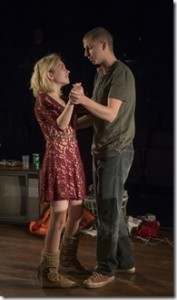 • This Is Our Youth (drama, PG-13, closes Jan. 4, reviewed here)
• This Is Our Youth (drama, PG-13, closes Jan. 4, reviewed here)
OFF BROADWAY:
• The Fantasticks (musical, G, suitable for children capable of enjoying a love story, reviewed here)
IN NIAGARA-ON-THE-LAKE, ONTARIO:
• Arms and the Man (comedy, G/PG-13, closes Oct. 18, reviewed here)
• The Sea (black comedy, PG-13, closes Oct. 26, closes Oct. 12, reviewed here)
• When We Are Married (comedy, PG-13, closes Oct. 26, reviewed here)
IN SPRING GREEN, WIS.:
• American Buffalo (drama, PG-13, closes Nov. 8, reviewed here)
CLOSING SOON IN SPRING GREEN, WIS.:
• The Doctor’s Dilemma (serious comedy, G/PG-13, closes Oct. 3, reviewed here)
• Travesties (serious comedy, PG-13, closes Oct. 3, reviewed here)
CLOSING SOON OFF BROADWAY:
• The Wayside Motor Inn (drama, PG-13, closes Oct. 5, reviewed here)
CLOSING SATURDAY IN SPRING GREEN, WIS.:
• The Seagull (drama, G/PG-13, reviewed here)
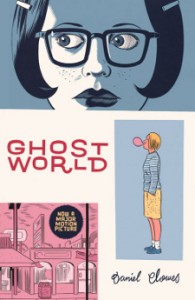 In 2001 I wrote a review of the film version of Daniel Clowe’s Ghost World that was published in Crisis. I recently had occasion to think about the film, and thought it might be interesting to post what I wrote about it thirteen crowded years ago.
In 2001 I wrote a review of the film version of Daniel Clowe’s Ghost World that was published in Crisis. I recently had occasion to think about the film, and thought it might be interesting to post what I wrote about it thirteen crowded years ago.
For the record, I wrote this review immediately after having seen Ghost World for the first time, and there are a few details that I probably would have changed after seeing it again. Nevertheless, I feel the same way today.
* * *
Good art, like grace, sometimes comes in peculiar-looking packages. Terry Zwigoff’s Ghost World, a screen version of the underground comic book by Daniel Clowes, is a bleakly melancholic comedy about a pair of foul-mouthed teenage girls. You wouldn’t expect it to be much more than a symptom of the degraded state of postmodern American life—but you’d be wrong. Not since Kenneth Lonergan’s masterful You Can Count on Me last year have I seen a movie that cuts as close to the bone. It is by far the best American film of the year to date and among the finest of any kind to be released in the past decade.
Enid (Thora Birch) and Rebecca (Scarlett Johansson), Clowes’s anti-heroines, have spent the whole of their short lives trapped in a grubby pop-culture hell of strip malls, convenience stores, and round-the-clock Muzak. Their only defense against this smothering tackiness is to embrace it with a sneer, hanging out in faux-Fifties diners and mocking everything they see and everyone they meet. They are best friends—indeed, they have no other friends, except for Josh (Brad Renfro), a hapless boy whom they delight in tormenting—and it soon becomes apparent that much of their contempt is defensive, for nobody else seems to like them.
As Ghost World begins, Enid and Rebecca have just graduated from high school and are looking for an apartment to share, having decided to skip college and go to work. For all her seeming alienation, Rebecca turns out to be perfectly willing to swallow her disgust, get a nine-to-five job at a coffee bar, and become a reluctant member of the “ghost world” of adulthood. Enid, who is both brighter and more idealistic than Rebecca, is looking for something different, and she finds it in the unlikely person of Seymour (Steve Buscemi), a buck-toothed, middle-aged corporate wheelhorse who collects old blues 78s, loves W.C. Fields movies, and hasn’t been out on a date in four years.
Enid takes it upon herself to find him a girlfriend, explaining to the mystified Rebecca that even though he is a “clueless dork,” he is also “the exact opposite of all the things I hate.” In time, their mutual misanthropy draws them closer together, and Enid, whose own father (Bob Balaban) is pathetically prissy and ineffectual, comes to see the self-loathing Seymour as a kind of role model, a man of taste who has found a way to live in a tasteless world without compromising his bumbling integrity.
If that were as far as Ghost World went, it would be nothing more than a smart teen-angst flick with a keen satirical edge. But Zwigoff and Clowes take another, far riskier step: Enid seduces Seymour, an act of terrible irresponsibility to which she is driven less by lust than loneliness. Though she fantasizes about running away with him, their friendship is shattered by this brief sexual encounter, and the movie comes to a sad and ambiguous close as she boards a bus and departs on a solitary pilgrimage to parts unknown, leaving behind the wreckage of her lost youth.
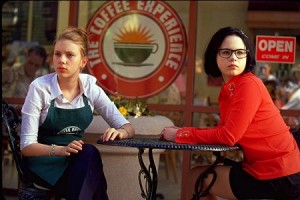 Thora Birch, a raven-haired nineteen-year-old who plays Enid with a heartbreaking combination of cynicism and fragility, also appeared in American Beauty (1999). Ghost World may seem at first glance to echo that smug film’s unearned contempt for suburban life. But American Beauty offered easy answers to loaded questions (that’s why it won so many Oscars—Hollywood gives prizes only to movies that tell us what it wants to hear), whereas Ghost World is a movie without any answers at all. That is the source of its pathos. Like every teenager, Enid longs to be shown how to live, but the ghostly adults who drift in and out of her unhappy life offer her no counsel. Instead, she has been set adrift on the sea of relativity, looking for a safe harbor on an uncharted coast.
Thora Birch, a raven-haired nineteen-year-old who plays Enid with a heartbreaking combination of cynicism and fragility, also appeared in American Beauty (1999). Ghost World may seem at first glance to echo that smug film’s unearned contempt for suburban life. But American Beauty offered easy answers to loaded questions (that’s why it won so many Oscars—Hollywood gives prizes only to movies that tell us what it wants to hear), whereas Ghost World is a movie without any answers at all. That is the source of its pathos. Like every teenager, Enid longs to be shown how to live, but the ghostly adults who drift in and out of her unhappy life offer her no counsel. Instead, she has been set adrift on the sea of relativity, looking for a safe harbor on an uncharted coast.
Walker Percy once pointed out that a visit to the neighborhood theater is for many Americans “maybe the only point in the day, or even the week, when someone (a cowboy, a detective, a crook) is heard asking what life is all about, asking what is worth fighting for—or asking if anything is worth fighting for.” Out of that insight grew The Moviegoer, a novel about a man who goes to the movies in order to narcotize himself against the shallowness of American life, unaware that by doing so he has embarked on a search for meaning that will ultimately end in his embrace of Catholicism. As improbable as it may sound, Ghost World reminded me quite strongly of Percy’s great novel. To be sure, Enid lacks the spiritual consciousness that helped Percy’s protagonist, Binx Bolling, find his way out of the slough of despond, but she is just as surely going forth on a similar quest, and the fact that she is doing so without benefit of moral guidance makes her plight all the more moving.
I could go on and on about Ghost World, and I do want at least to mention Steve Buscemi’s uncanny performance as Seymour—it is so true to life that it will make you squirm in your seat—and David Kitay’s wistful score, which serves as a quiet reminder that Enid and Rebecca are far more vulnerable than they pretend.
By now, though, I suspect that more than a few people are reading this review with raised eyebrows, to which I can only reply that Ghost World is so good that it caught me off guard. It has been a frightful year for American movies, especially those aimed at adolescents, and the last thing I expected from Terry Zwigoff and Daniel Clowes was a film full of felt life and exactly rendered social observation (though one of the most striking aspects of Ghost World, as it happens, is the subtle way in which Zwigoff has imported the exaggeration and semiabstract simplicity of comic-book art into a cinematic context). You may find it uncomfortable, but you will also find it revelatory.
* * *
Skip James’ 1931 recording of “Devil Got My Woman,” as heard on the soundtrack of Ghost World:
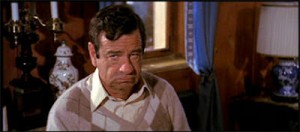 I’ve been thinking about Walter Matthau, one of my all-time favorite movie stars and among the very few character actors—Edward G. Robinson was another—who managed to become an above-the-title leading man in spite of the fact that he wasn’t conventionally attractive. I once considered writing a lengthy essay about Matthau, but his offstage life was insufficiently interesting or eventful (he was a near-degenerate gambler who liked classical music and spent most of his time making movies) to justify extended treatment. Moreover, I soon realized that I’d already written that piece, more or less, when I wrote about Robert Mitchum for Commentary.
I’ve been thinking about Walter Matthau, one of my all-time favorite movie stars and among the very few character actors—Edward G. Robinson was another—who managed to become an above-the-title leading man in spite of the fact that he wasn’t conventionally attractive. I once considered writing a lengthy essay about Matthau, but his offstage life was insufficiently interesting or eventful (he was a near-degenerate gambler who liked classical music and spent most of his time making movies) to justify extended treatment. Moreover, I soon realized that I’d already written that piece, more or less, when I wrote about Robert Mitchum for Commentary.
Like Mitchum, Matthau was the quintessential example of a greatly gifted artist who didn’t take his art seriously enough to challenge himself. He played leading roles in a dozen Broadway plays, virtually all of which were flops, before finally hitting the jackpot in 1965 with Neil Simon’s The Odd Couple. After that, he never again appeared on the New York stage, preferring to make vast amounts of money in Hollywood, most of which he gambled away. Nor did he ever make a film remotely as distinguished as Charles Laughton’s The Night of the Hunter, which left no possible doubt of Robert Mitchum’s ability to grapple with uncompromisingly serious material. “Listen, for twenty-five years I’ve been a serious actor,” Matthau had told Mike Nichols at an Odd Couple rehearsal. “Now, I want to be a popular actor.” So he spent the rest of his life making genre films of various kinds, and though a few of them, including Charley Varrick, Hopscotch, House Calls, I.Q., A New Leaf, The Taking of Pelham One Two Three, and (of course) the screen version of The Odd Couple, are memorable, most were instantaneously forgettable.
On three widely separated occasions, Matthau appeared in TV versions of major plays, Clifford Odets’ Awake and Sing!, Sean O’Casey’s Juno and the Paycock, and Othello, in which he played Iago, his only Shakespearean role. Toward the end of his life, he singled out the last of these appearances as the highlight of his career: “Most of my work is crap, I’m waiting for something good. I did a good thing in 1952, on the Philco Playhouse. I played Iago. That I liked.” But while he talked at odd intervals about returning to the stage—he actually claimed to have given some thought to trying his hand at Lear—he only followed through once, doing Juno in Los Angeles in 1974. From then on he usually settled for throwaway films like The Odd Couple II.
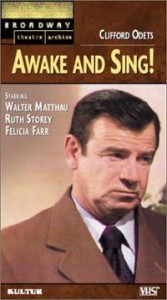 Every artist has a right to be judged by his best work, and by that standard Matthau still has a strong claim on the attention of anybody who cares about good acting. He was an immensely charismatic and knowing craftsman with a much wider range than is commonly acknowledged, and his nasal, gravelly whine and basset-hound face always added value to the drossiest of the films in which he starred. Yet I can’t help but recall what David Thomson wrote about him in his Biographical Dictionary of Film: “There’s something sad in that Matthau’s occasional appearances on talk shows—poker-faced, piss-eloquent, a collection of anecdotes and disguises—were invariably more interesting than his pictures.”
Every artist has a right to be judged by his best work, and by that standard Matthau still has a strong claim on the attention of anybody who cares about good acting. He was an immensely charismatic and knowing craftsman with a much wider range than is commonly acknowledged, and his nasal, gravelly whine and basset-hound face always added value to the drossiest of the films in which he starred. Yet I can’t help but recall what David Thomson wrote about him in his Biographical Dictionary of Film: “There’s something sad in that Matthau’s occasional appearances on talk shows—poker-faced, piss-eloquent, a collection of anecdotes and disguises—were invariably more interesting than his pictures.”
Even more to the point is a conversation that John Williams, the Star Wars man, once reported having had with Bernard Herrmann:
He was never flattering, but he encouraged me. In the early sixties I wanted to write a symphony. One day at lunch I complained to Benny about wanting to write some music other than film music. He answered, “Who’s STOPPING ya?” His answer was so blatant and direct—and right—that I went home and spent the requisite four or five months writing this piece.
That, I fear, must be Walter Matthau’s epitaph: he stopped himself from trying harder. Or, as he confessed to a journalist who interviewed him while he was taping Awake and Sing!, “It’s too easy being a movie actor. Spoils you for other things.” And so it did.
| M | T | W | T | F | S | S |
|---|---|---|---|---|---|---|
| 1 | 2 | 3 | ||||
| 4 | 5 | 6 | 7 | 8 | 9 | 10 |
| 11 | 12 | 13 | 14 | 15 | 16 | 17 |
| 18 | 19 | 20 | 21 | 22 | 23 | 24 |
| 25 | 26 | 27 | 28 | 29 | 30 | |
An ArtsJournal Blog